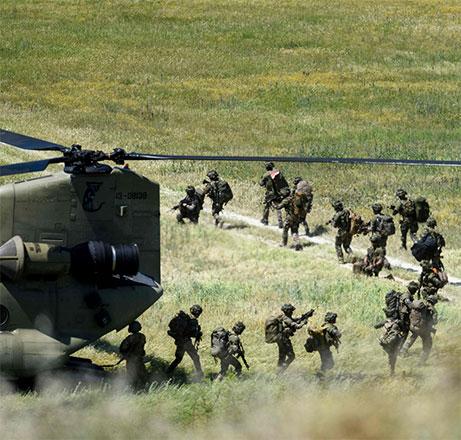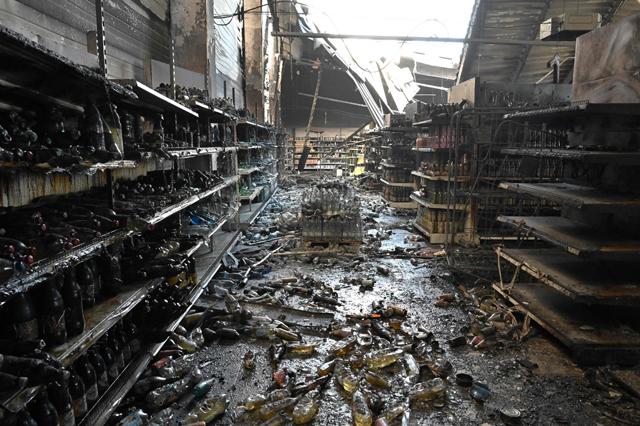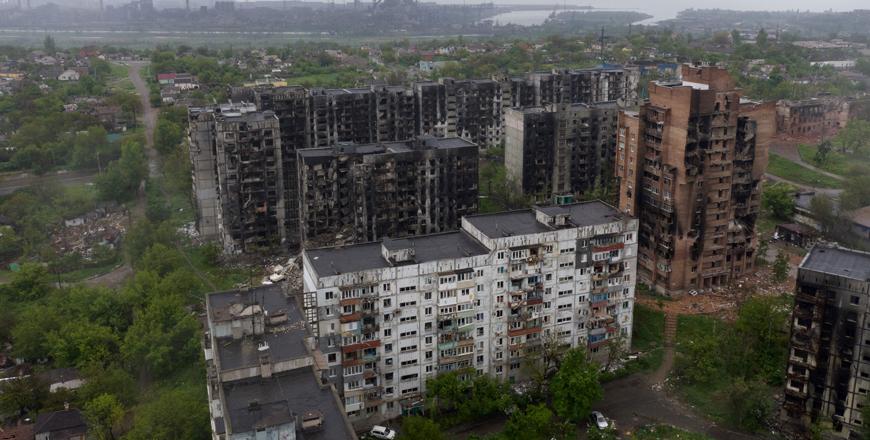You are here
Finland poised for NATO membership as Ukraine war crimps Russian gas
By AFP - May 13,2022 - Last updated at May 13,2022

British soldiers deploy from a US helicopter during the Swift Response 22 military exercise at the Krivolak Military Training Centre in Negotino, in the centre of North Macedonia, on Thursday (AFP photo)
KYIV, Ukraine — Finland on Thursday took a step towards fast-track membership of NATO, triggering a blunt warning from the Kremlin, as the war in Ukraine throttled supplies of Russian gas to Europe.
In Geneva, the UN Human Rights Council decided to probe alleged Russian atrocities in Ukraine, in a vote overwhelmingly approved by its members but snubbed by Russia.
Announcing a seismic change in policy since Russia invaded its neighbour in February, Finland's leaders declared their nation must apply to join NATO "without delay".
"NATO membership would strengthen Finland's security," President Sauli Niinisto and Prime Minister Sanna Marin said in a joint statement in Helsinki.
"As a member of NATO, Finland would strengthen the entire defence alliance."
But Kremlin spokesman Dmitry Peskov warned Russia would "definitely" see Finnish membership as a threat.
The Russian foreign ministry said Moscow would be "forced to take reciprocal steps, military-technical and other, to address the resulting threats to its national security".
In launching the invasion of Ukraine, President Vladimir Putin cited in part what he called the threat from NATO, which expanded eastwards after the Cold War.
The foreign ministry accused NATO of seeking to create "another flank for the military threat to our country".
"Helsinki should be aware of its responsibility and the consequences of such a move," it said.
Finland has been a declared neutral in East-West crises for decades, and as recently as January its leaders ruled out NATO membership of the alliance.
But the February 24 invasion shocked the Nordic nation.
It shares a 1,300-kilometre border with Russia and its past is studded with conflict with its giant neighbour.
NATO has already declared it will warmly embrace the two countries with deep pockets and well-equipped armies.
Finland's entry will be "smooth and swift", NATO chief Jens Stoltenberg promised on Thursday.
Germany, France and the powerful US Senate Foreign Relations Committee also strongly voiced their support, and Britain has already pledged its assistance.
A special committee will announce Finland's formal decision on a membership bid on Sunday. Sweden, another neutral state, is widely expected to follow its neighbour.
Russia’s flow of gas to Europe fell meanwhile, spurring fears for Germany and other heavily-dependent economies.
Russian energy giant Gazprom announced it would stop supplying gas via the Polish part of the Yamal-Europe pipeline following retaliatory sanctions that Russia slapped on Western companies on Wednesday.
Gazprom also said gas transiting to Europe via Ukraine had dropped by a third — a fall it blamed on Ukraine’s pipeline operator, which the company denies, pointing the finger at Russia.
Ukraine and Poland are major supply routes for Russian gas to Europe and the two sides have kept flows going despite the conflict.
The European Union’s heavy reliance on Russian energy has made it reluctant to add oil and gas imports to sanctions that are inflicting a toll on Russia’s economy.
Germany accused Russia of using “energy as a weapon”.
“The situation is coming to a head,” Economy Minister Robert Habeck said.
The EU is struggling to overcome Hungarian resistance for plans to ban Russian oil.
Mykhailo Podolyak, a senior aide to Ukrainian President Volodymyr Zelensky, drew a parallel with the 1930s as he urged the bloc to impose an immediate embargo.
“If the leaders had acted decisively in 1938, Europe could have avoided WWII,” he wrote on Twitter. “History won’t forgive us if we make the same mistake again.”
Shelling
Fighting in Ukraine has been concentrated on the south and east since Russia abandoned attempts to seize Kyiv in the opening weeks of the war.
Ukraine’s presidency said shelling continued throughout Lugansk — part of the Donbas region where Ukrainian forces are fiercely opposing Russian armour and Kremlin-backed separatists.
Russian troops are trying to take complete control of Rubizhne, block a key highway between Lysychansk and Bakhmut and seize Severodonetsk, the office said.
In the northeastern region of Chernihiv three people were killed and 12 others wounded early Thursday in a strike on a school in Novgorod-Siversky, the emergency services said.
In the southern port city of Mariupol, besieged troops in the vast Azovstal steelworks have been holding out against weeks-long bombardment, refusing demands to surrender.
Ukrainian Deputy Prime Minister Iryna Vereshchuk said “difficult talks” were underway over the evacuation of 38 seriously wounded troops.
War crimes probe
In Geneva, the UN Human Rights Council voted 33-2, with 12 abstentions, to investigate alleged atrocities BY Russian troops.
The resolution, brought by Ukraine, will focus on alleged crimes in the Kyiv, Chernihiv, Kharkiv and Sumy regions in late February and in March, “with a view to holding those responsible to account”.
“These have been 10 weeks of sheer horror to the people of my country,” Deputy Foreign Minister Emine Dzhaparova told the UN meeting from Kyiv.
“Only the world standing strong in solidarity with the Ukrainian people can defeat this pure evil.”
The International Criminal Court (ICC) in The Hague has already begun its own inquiry, sending investigators to the Kyiv suburb of Bucha.
The invasion has sparked an exodus of nearly six million civilians, many of whom describe torture, sexual violence and indiscriminate destruction.
Ukrainian prosecutors say they have received reports of more than 10,000 alleged crimes, with 622 suspects identified.
On Wednesday, the office said it would launch the first trial for war crimes.
Vadim Shishimarin, a 21-year-old Russian soldier, is accused of killing an unarmed 62-year-old civilian as he fled with four other soldiers in a stolen car.
Dilemmas
Across Ukraine, lives have been turned upside down, forcing millions to make anguished choices of how to respond.
Zhanna Protsenko, a social worker in the frontline town of Orikhiv, spoke to AFP as she was about to head off on her bicycle to visit people who refused or were unable to evacuate.
“How can I leave them here?” the 56-year-old asked, standing near a hospital that was hit by a strike in the past week.
“We work. We have no time to hide,” she said as contractors repaired rows of blown-out windows and an oil drum-sized hole blasted in the hospital’s brick facade.
Related Articles
KREMENCHUK, Ukraine — Russia vowed on Tuesday its assault on Ukraine would continue until Kyiv surrenders, as world leaders warned that Mosc
MOSCOW — Moscow's forces destroyed a large shipment of Western-supplied weapons in northwestern Ukraine with long-range missiles, the Russia
KYIV, Ukraine — Russia said on Thursday that 1,730 Ukrainian soldiers had surrendered this week at the Azovstal steel plant in Mariupol, sho

















